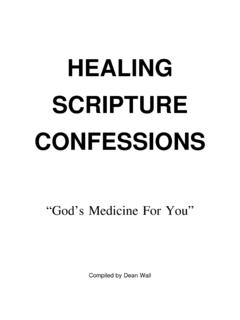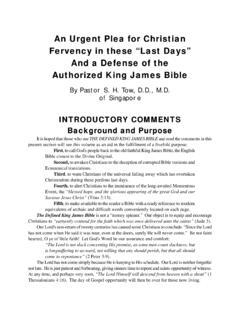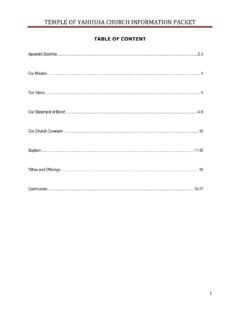Transcription of STUDIES IN DOCTRINES - drnichols.org
1 Other STUDIES Available At STUDIES . IN. DOCTRINES . THE DECREE OF GOD. Ed Nichols Copyright @ 1997 by Ed Nichols OUTLINE. I. INTRODUCTION .. Definition .. II. DECREES .. A. Omniscience .. B. Divine Foreknowledge .. C. Divine Immutability .. D. Predestination .. E. Election .. F. Preterition .. G. Additional Decrees .. III. PURPOSE .. IV. OBJECTIONS .. V. CONCLUSIONS .. INTRODUCTION. Definition Several definitions of the decrees of God have been put forth by noted theologians. Augustus H. Strong, Systematic Theology; Henry C. Thiessen, Lectures in Systematic Theology; and Lewis S. Chafer, Systematic Theology all stress the same premise concerning the decree of God. Though their definitions seem to vary they are likewise similar in at least two points.
2 These two points are; first that the decrees or decree is God's singular complete plan; and second that His plan encompasses the past, present and future that God has decided will happen. Acts 15:17-18 NIV states that "these been known for ages." or as it is translated in the King James version of Acts 15:18 KJV "Known unto God are all his works from the beginning of the world.". According to Lewis S. Chafer, in his book on Systematic Theology, decrees are defined; "In theology divine decrees refer to the total plan of God which includes everything past, present, and future that God has determined will come to pass."1. God's total plan is "According to the eternal purpose which he purposed in Christ Jesus our Lord" Eph This plan consists of all things which God causes to occur, as well as, those things which he permits to happen which are caused by entities other than himself.
3 To simply state what the decree of God is; would be to say that it is that which God determined He would permit and will permit to happen now and forever. All that is or will be is part of God's plan (decree). 1 Lewis Sperry Chafer, Chafer Systematic Theology, 2 Vols. (Dallas: Dallas Seminary Press, 1948), 1:154. DECREES. An understanding of decrees should come easily when seen in the light of Eph In whom also we have obtained an inheritance, being predestinated according to the purpose of him who worketh all things after the counsel of his own will. This scripture is extremely complete in its coverage of much of what we know of as the Decree of God. It begins with God and progresses through, salvation, eternal life, God's foreknowledge, His purpose, His decrees.
4 Within God's singular decree, although one decree covers everything, man has placed multiple decrees. It may appear that several events are involved but God determined that His decree would be all inclusive. This is noted in Eph as previously quoted above. Listed below with a brief description are just a few of the decrees which make up God's decree. Those decrees selected deal mainly with God's sovereignty and man's free will as it relates to sin or salvation. Omniscience. When one thinks of the sovereignty of God one must be aware that His sovereignty encompasses or contains the complete knowledge concerning all things. Divine Foreknowledge. In eternity nothing existed except the divine mind thus nothing exist without God's prior knowledge. God knows everything and the order in which it will occur as an action or event.
5 His foreknowledge of sin demonstrates His foreknowledge of the necessity of the cross as a redemption for sin. God's divine and infinite wisdom, has provided a plan to cover all circumstances. Divine immutability. God's plan is unchangeable and without any dependency on men. God's purpose will be completed and there is no one or nothing that is equal to God. Man may wonder at how God will accomplish His purpose, however Ephesians states that His purpose will occur "Surely as I had who shall turn it back?". The Lord of hosts hath sworn, saying, Surely as I have thought, so shall it come to pass; and as I have purposed, so shall it stand:.. This is the purpose that is purposed upon the whole earth: and this is the hand that is stretched out upon all nations.
6 For the Lord of hosts hath purposed. And who shall disannul it? And his hand is stretched out, and who shall turn it back? Isa Predestination Predestination seems to be one of those decrees that causes men difficulty. It is the knowledge that God has provided for the disposition of those chosen as the elect. This word predestination relates to the destination of all of Gods creatures, angelic or human. Some of the humans have chosen God's redemptive plan and will be glorified. "Moreover whom he did predestinate, them he also called: and whom he called, them he also justified: and whom he justified, them he also glorified." Rom Election. Election is for those individuals or nations which God has chosen for his people. This refers to Christians who are striving to serve God and have established a relationship with Him and have been given the assurance of eternal life.
7 This is not as difficult a decree as many claim it to be. When seen in the light of God's foreknowledge it is understood that God knew who would accept or reject his plan for saving men from their paths of sin. Rom "For whom he did foreknow, he also did predestinate to be conformed to the image of his Son,". Man's option in this case is to accepted God's decree. Preterition. Preterition or retribution is an action which God determines is necessary to deal with the non-elect. A passing over them because of their attitude toward God. A just God has provided punishment for those individuals who do not elect to receive His plan of redemption. Additional decrees. The scriptures point out that everything is included in the decrees. Also included are things which we might not consider as included, such as, how does the earth remain in orbit, what is the destiny of nations, how long will man live, how will he die, are men really free agents with the ability to select good or evil?
8 In addition, there are decrees concerning the doctrine of salvation, Christ's kingdom, and the work of Christ to fulfill God's plan. Even though we do not understand why God made decrees, we will know someday in God's time. John says "You shall understand hereafter". God's decrees are wise and all knowing and will provide a way which He deems appropriate for saving man from sin. PURPOSE. Man would like to believe that God's decrees were for man. That all God has done was surely for man and that God's decrees were for the glory of man. Thiessen suggest that "The highest aim of the decrees is the glory of God." 2 and Rev 4:11. states 2 Henry C. Thiessen, Lectures in Systematic Theology, (Michigan: Eerdmans, 1990) 103. Thou art worthy, O Lord, to receive glory and honour and power; for thou hast created all things, and for thy pleasure they are and were created.
9 God's purpose should be clear. His purpose was from the beginning of His decree that it would be as He would have it, and that only His purpose would be accomplished. This premise is best explained by Eph Having made known unto us the mystery of his will, according to his good pleasure which he hath purposed in himself: That in the dispensation of the fullness of times he might gather together in one all things in Christ, both which are in heaven, and which are on earth. OBJECTION. If one is searching for exceptions or objections to the decree of God, some find the objections with the questions of sin and man's free will. For those individuals who search for problems or incongruities in the decree of God, Chafer calls these objection "the moral problem" and "the human will".
10 3 According to Chafer the moral problem prompts the question, "How can God who is infinitely holy allow sin to exist in the universe?"4 The answer is evident in that because He is God he not only permitted it, but provided a sacrificial alternate for those caught in it's snares. As a decree of God He provided His Son's death on the cross to cover the sins of the world. All that need be done by man to claim God's salvation decree is to accept Jesus Christ as Lord in their lives. The problem of human will does not undermine God's will as some believe. Human will provides man the freedom to select from two choices. Man must use his will to choose between good and evil, God or satan. God's sovereignty shows that He is able to provide man with free will while maintaining His control of His decree for man.










